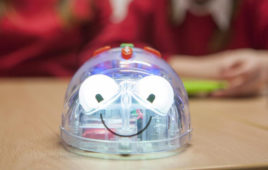Major mental illnesses such as schizophrenia, severe depression and bipolar disorder share a common genetic link. Studies of specific families with a history of these types of illnesses have revealed that affected family members share a mutation in the gene DISC1. While researchers have been able to study how DISC1 mutations alter the brain during development in animal models, it has been difficult to find the right tools to study changes in humans. However, advancements in engineering human stem cells are now allowing researchers to grow mini-organs in labs, and gene-editing tools can be used to insert specific mutations into these cells.
Researchers from Brigham and Women’s Hospital are leveraging these new technologies to study the effects of DISC1 mutations in cerebral organoids — “mini brains” — cultured from human stem cells. Their results are published in Translational Psychiatry.
“Mini-brains can help us model brain development,” said senior author Tracy Young-Pearse, PhD, head of the Young-Pearse Lab in the Ann Romney Center for Neurologic Diseases at BWH. “Compared to traditional methods that have allowed us to investigate human cells in culture in two-dimensions, these cultures let us investigate the three-dimensional structure and function of the cells as they are developing, giving us more information than we would get with a traditional cell culture.”
The researchers cultured human induced pluripotent stem cells (iPSCs) to create three-dimensional mini-brains for study. Using the gene editing tool CRISPR-Cas9, they disrupted DISC1, modeling the mutation seen in studies of families suffering from these diseases. The team compared mini-brains grown from stem cells with and without this specific mutation.
DISC1-mutant mini-brains showed significant structural disruptions compared to organoids in which DISC1 was intact. Specifically, the fluid-filled spaces, known as ventricles, in the DISC1-mutant mini-brains were more numerous and smaller than in controls, meaning that while the expected cells are present in the DISC1-mutant, they are not in their expected locations. The DISC1-mutant mini-brains also show increased signaling in the WNT pathway, a pathway known to be important for patterning organs and one that is disrupted in bipolar disorder. By adding an inhibitor of the WNT pathway to the growing DISC1-mutant mini-brains, the researchers were able to “rescue” them — instead of having structural differences, they looked similar to the mini-brains developed from normal stem cells. This suggests that the WNT pathway may be responsible for the observed structural disruption in the DISC1-mutants, and could be a potential target pathway for future therapies.
“By producing cerebral organoids from iPSCs we are able to carefully control these experiments. We know that any differences we are seeing are because of the DISC1-mutation that we introduced,” said Young-Pearse. “By looking at how DISC1-mutations disrupt the morphology and gene expression of cerebral organoids, we are strengthening the link between DISC1-mutation and major mental illness, and providing new avenues for investigation of this relationship.”


